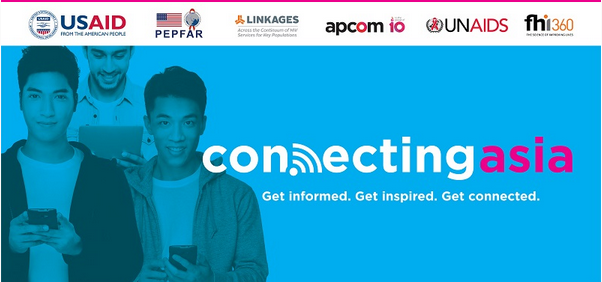
14 Jun, 2017
Asia-based HIV Workers Explore Innovative Use of Social Media to Combat Rising Infection Rate
BANGKOK, June 14, 2017 (APcom Press release) – Reducing rising rates of HIV transmission among Asian gay men through the innovative use of digital communications is the focus of a special event which opened today in Bangkok.
Connecting Asia is a three-day regional consultation – the first event of its kind in Asia – that will help over 150 HIV and community health workers from 22 countries across the region improve how they use information and communication technologies (ICT) to get gay men and men who have sex with men (MSM) to connect with HIV prevention, testing and treatment.

“Social networking and social media are opening doors to inclusiveness like never before,” said U.S. Ambassador Glyn T. Davies, who gave the opening address at the event. “The Internet allows for more voices to be heard, more perspectives to be shared, and more effective solutions to be reached. Social media platforms offer innovative new tools to help hasten an end to AIDS.”
The event is supported by United States President’s Emergency Plan for AIDS Relief (PEPFAR) through the United States Agency for International Development (USAID) LINKAGES Project implemented by FHI360, and by UNAIDS.
Asia has been experiencing a rapidly escalating HIV epidemic among MSM. The Commission on AIDS in Asia has indicated that by 2020 close to half of all new HIV infections in the region will be among MSM, and data from national surveys indicate the issue is particularly significant among young MSM in urban areas. HIV prevalence among MSM is reaching as high as 32% in Jakarta and 22% in Kuala Lumpur. In Bangkok, almost one in three MSM is living with HIV.
Organized by APCOM, a regional community network, Connecting Asia convenes frontline HIV and community health workers with leading experts from the ICT and HIV sectors. These include the vice president of global gay dating app, Blued; the head of Google Thailand; content producers from MTV; award winning HIV educators, specialist academics; and experts from USAID, UNAIDS and UNICEF.
Participants will explore topics such as promoting HIV prevention and testing via social media and mobile dating apps, as well as using ICT to help people with HIV get treatment. There will also be a challenge to develop new ICT based HIV initiatives that could potentially attract international development funding.
“Advances in ICT are rapidly changing the way gay men and MSM connect with each other, as well as how they access and consume content,” APCOM Executive Director Midnight Poonkasetwattana said. “As community educators, we need to ensure we’re right there alongside them with messaging that’s effective in terms of technology as well as culture.”
APCOM Executive Director Midnight Poonkasetwattana welcoming the participants of Connecting Asia (left); Director of the UNAIDS Regional Support Team for Asia and the Pacific Steve Kraus delivering opening plenary on the history of the HIV epidemic in Asia and the road to the 90-90-90 targets (right)
“Ending AIDS by 2030 requires all of us to think outside of the box,” said Steve Kraus, Director of UNAIDS Regional Support Team for Asia and the Pacific. “With new HIV infections rising among gay men and other men who have sex with men in many countries in Asia and the Pacific, it is crucial that we move into the next generation of HIV prevention. AIDS is not yet over, but it can be if we innovate our outreach, treatment and retention approaches for men who have sex with men.”
For more information about Connecting Asia please visit: www.apcom.org/ConnectingAsia
Be part of the Connecting Asia conversation online by using: #ConnectingAsiaHIV



Liked this article? Share it!